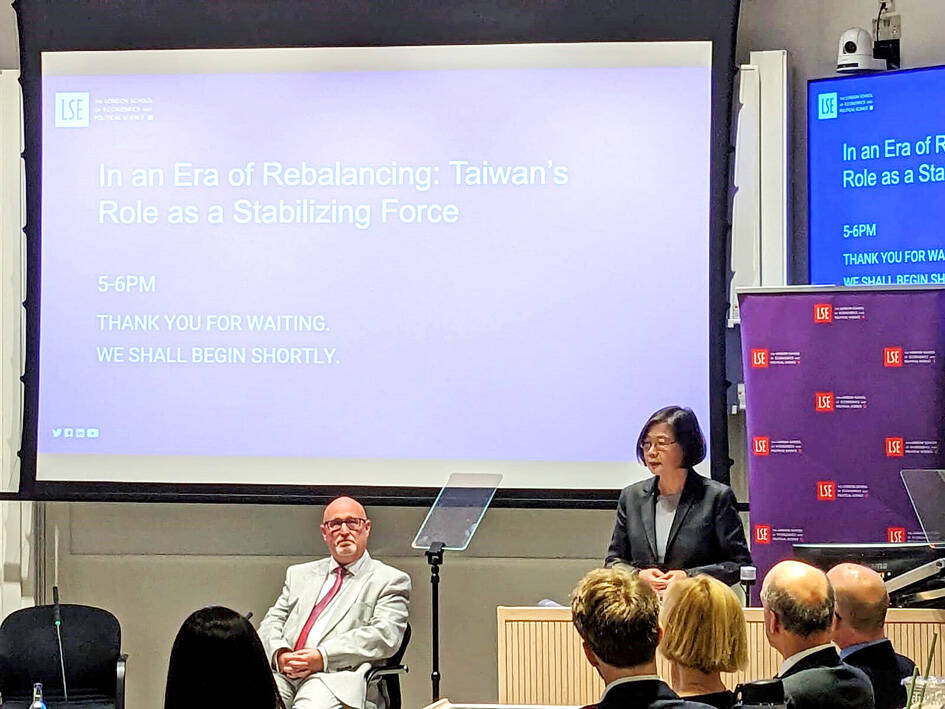Taiwan’s resilience will help the country overcome the challenges of the global trade crisis created by the White House’s tariff policies, former president Tsai Ing-wen (蔡英文) said on Saturday in a speech at her alma mater, the London School of Economics and Political Science (LSE).
The global community is experiencing a “new geopolitical landscape that can be defined by the uncertainty and unpredictability surrounding the existing trade and security orders,” Tsai said at the university where she was awarded a doctorate in law in 1984.
“The trade conflicts we are seeing now are challenging the decades-old international trade rules and order,” she said.

Photo courtesy of a member of the public via CNA
Although Taiwan, which largely depends on international trade, is also vulnerable to shifts in the global trade system, it has withstood numerous global crises over the past decades, as it was able to “transform adversity into opportunity” during such challenges.
“The reason that Taiwan could weather each global trade crisis was because Taiwan never retreated into protectionism. Instead, Taiwan reinforced its economic fundamentals and enhanced industrial competitiveness,” she said.
Taiwan’s positive attitude toward challenges enabled it to form a strategy to go beyond China’s “red supply chain” competition, Tsai said.
Taiwan maintained its competitiveness by becoming an “indispensable provider of key components in global supply chains” through the strategy of “hidden champions,” she said.
“In other words, Taiwanese companies strive to be the best partner in certain niche markets, through providing the best quality products with the most reliable services in the global supply chain,” Tsai said.
“Taiwan’s experience through different adjustment periods of the world trading system gave us added confidence in facing the current US administration’s tariff-driven efforts to reduce the trade deficit,” she added.
Tsai said she is confident that the current administration in Taipei would do its best to engage the US in dialogue and support its industries to adjust accordingly so that Taiwan can remain competitive and continue to contribute to the global trading system.
Aside from international trade challenges, Taiwan and democracies around the world are also facing security challenges, she said.
“What this means is that we will have to be even more aware of and responsive to the attempts that seek to weaken our democracies and destabilize our societies. This will require that we all enhance and bolster our resilience,” she said.
Tsai also discussed her memories of attending the prestigious university.
“At LSE, I met students and faculty from all over the world and from different fields of study. I thoroughly enjoyed the diversity and the academic environment here, where discussions of issues relating to our respective countries and the world are strongly encouraged,” she said.
Her years at LSE helped her master English and hone her communication skills, as well as enhance her critical thinking, she said, adding that most importantly, she learned to listen to people with whom she disagreed.
“My experience at LSE made me the kind of trade negotiator I was, and it prepared me for my career in academia, and above all, in politics,” she said.

Beijing could eventually see a full amphibious invasion of Taiwan as the only "prudent" way to bring about unification, the US Department of Defense said in a newly released annual report to Congress. The Pentagon's "Annual Report to Congress: Military and Security Developments Involving the People's Republic of China 2025," was in many ways similar to last year’s report but reorganized the analysis of the options China has to take over Taiwan. Generally, according to the report, Chinese leaders view the People's Liberation Army's (PLA) capabilities for a Taiwan campaign as improving, but they remain uncertain about its readiness to successfully seize

Taiwan is getting a day off on Christmas for the first time in 25 years. The change comes after opposition parties passed a law earlier this year to add or restore five public holidays, including Constitution Day, which falls on today, Dec. 25. The day marks the 1947 adoption of the constitution of the Republic of China, as the government in Taipei is formally known. Back then the Chinese Nationalist Party (KMT) governed China from Nanjing. When the KMT, now an opposition party in Taiwan, passed the legislation on holidays, it said that they would help “commemorate the history of national development.” That

Taiwan has overtaken South Korea this year in per capita income for the first time in 23 years, IMF data showed. Per capita income is a nation’s GDP divided by the total population, used to compare average wealth levels across countries. Taiwan also beat Japan this year on per capita income, after surpassing it for the first time last year, US magazine Newsweek reported yesterday. Across Asia, Taiwan ranked fourth for per capita income at US$37,827 this year due to sustained economic growth, the report said. In the top three spots were Singapore, Macau and Hong Kong, it said. South

HORROR STORIES: One victim recounted not realizing they had been stabbed and seeing people bleeding, while another recalled breaking down in tears after fleeing A man on Friday died after he tried to fight the knife-wielding suspect who went on a stabbing spree near two of Taipei’s busiest metro stations, Taipei Mayor Chiang Wan-an (蔣萬安) said. The 57-year-old man, identified by his family name, Yu (余), encountered the suspect at Exit M7 of Taipei Main Station and immediately tried to stop him, but was fatally wounded and later died, Chiang said, calling the incident “heartbreaking.” Yu’s family would receive at least NT$5 million (US$158,584) in compensation through the Taipei Rapid Transit Corp’s (TRTC) insurance coverage, he said after convening an emergency security response meeting yesterday morning. National